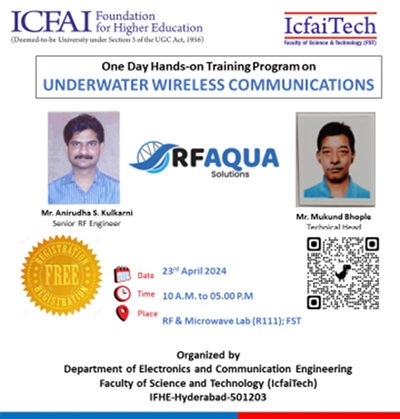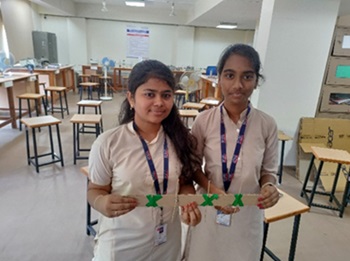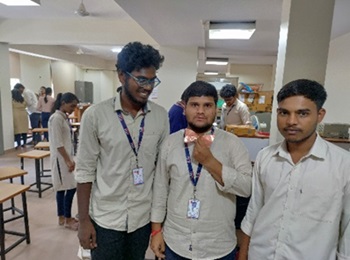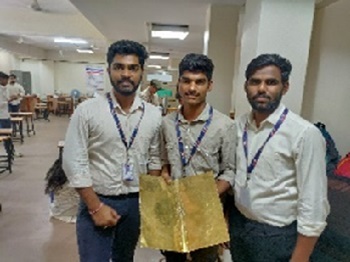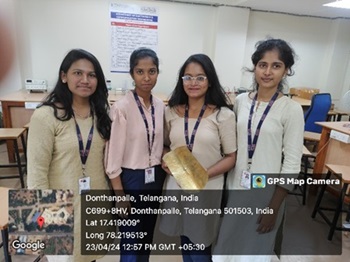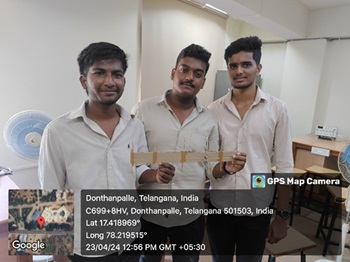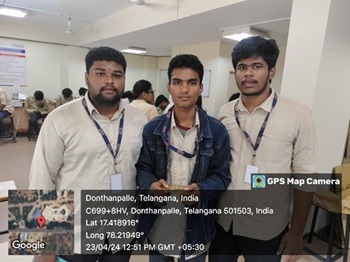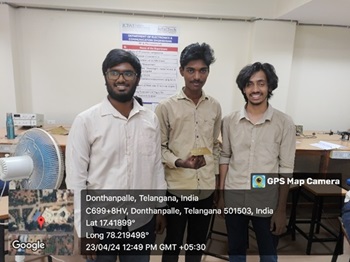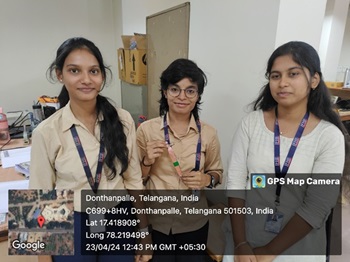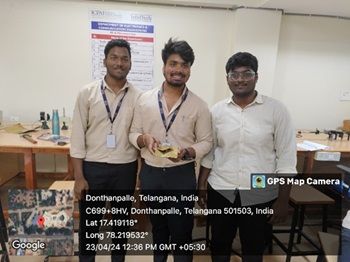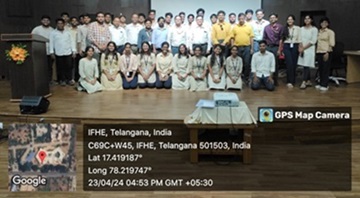

Director's Message:
IcfaiTech (Faculty of Science and Technology), a constituent school of the ICFAI Foundation for Higher Education (IFHE), organized an event to foster graduates and researchers into adept critical thinkers and innovators. The focus was on providing a comprehensive immersion in the realm of underwater wireless communications and RF technologies.
This event has provided undergraduate students and faculty members with a robust foundation to comprehend the experimental scope of communication in the current era of advanced wireless technologies. Implementing intriguing applications of state-of-the-art communication in our daily lives has showcased the practical implications of such technologies. With this modest commencement in scientific gatherings, I am optimistic that the forthcoming scenarios will be increasingly compelling, and directed towards addressing real-time challenges.
About Dept. of ECE and message from HOD:
Dr. Asisa Kumar Panigrahy, Associate Professor and Head of the Dept. of ECE
The department's main objective is to impart education and cultivate our students to proficiently apply engineering principles, methodologies, and systems, thereby effecting significant contributions to real-world development. Substantial endeavours have been dedicated to establishing state-of-the-art laboratories furnished with requisite hardware and simulation software across various domains including Electronics, Communication, Digital Signal Processing, RF and Microwave Engineering, Embedded Systems, Microcomputers, and VLSI Design. Additionally, the department has inaugurated a dedicated research laboratory concentrating on VLSI and related research domains.
The department offers interdisciplinary courses and projects to equip students with cross-cutting knowledge and learning systems, facilitating the pursuit of their interests. The curriculum undergoes periodic updates to incorporate emerging scientific and technical advancements, informed by rigorous brainstorming sessions with industry experts, alumni, and academic stakeholders. Encouraging undergraduate students to engage in diverse research projects and gain industry experience is highly recommended.
All faculty members within our department possess exemplary academic backgrounds and demonstrate exceptional motivation in guiding students toward noteworthy accomplishments. With a staff comprising 13 faculty members, 2 technical personnel, numerous research scholars, and esteemed industry professors, we ensure a robust academic environment. Our faculty members actively engage in the review of technical articles for both national and international journals, often serving on editorial boards. We are committed to equipping our students with the skills necessary to navigate real-world challenges by closely monitoring market trends. To facilitate this, the department offers a diverse array of elective and open elective courses, allowing students ample opportunity to pursue their interests.
Our department is structured around four principal research groups: RF and Microwave Communication, Antenna Design, IoT, and VLSI Design, each designed to prepare students for advanced studies and research endeavours. Leveraging innovative technologies, we aspire to contribute meaningfully to societal progress by addressing significant issues.
In addition, the Electronics and Communication Engineering Department at IcfaiTech school, IFHE Hyderabad has been designated as a Nodal Center by the Indian Institute of Remote Sensing (IIRS) in collaboration with the Indian Space Research Organization (ISRO). This prestigious designation provides a robust platform for faculty and students alike to enroll in online courses offered by IIRS, ISRO, and Dehradun, further enriching their academic pursuits.
The department's advancements in electronics, wireless and mobile communications, and VLSI system design are indeed remarkable. The tangible enthusiasm within our labs and classrooms inspires both faculty and students alike, fostering an environment conducive to the development of innovative ideas. Being part of the Electronics and Communication Engineering Department at ICFAI University Hyderabad is a gratifying experience, particularly in an era where electronics play an indispensable role in everyday life, holding the promise of ground-breaking innovations.
About the Program:
Title: Report on Hands-on Training Program on Underwater Wireless Communications
Date: 23rd April 2024
Venue: RF Microwave Lab (R111)
Coordinator: Dr. V. A. Sankar Ponnappalli
Introduction:
The Hands-on Training Program on Underwater Wireless Communications, conducted on April 23rd, 2024, at the RF Microwave Lab (R111), marked a significant event focused on imparting practical insights into the complexities and methodologies of underwater communication systems. Dr. V. A. Sankar Ponnappalli spearheaded the program, which encompassed the design of various antennas, including Yagi-Uda, Patch Antenna, Dish Antenna, and Reflector Antenna.
Program Overview:
The training initiative commenced with an introductory session elucidating the foundational principles of underwater wireless communications, with a particular emphasis on the distinctive attributes and hurdles inherent to the underwater milieu. Participants were provided comprehensive insights into signal propagation, attenuation mechanisms, and modulation techniques tailored specifically for underwater environments.
Hands-on Sessions:
The focal point of the program was the hands-on sessions, where participants engaged in the design and construction of various antennas commonly utilized in underwater communication systems. Under the guidance of seasoned instructors, attendees delved into the practical intricacies of antenna design, encompassing fabrication, tuning, and testing.
Antenna Designs:
1. Yagi-Uda Antenna: Participants were introduced to the principles underpinning Yagi-Uda antennas and their applicability in underwater communication. Through hands-on exercises, they crafted Yagi-Uda antennas optimized for effective underwater signal propagation.
2. Patch Antenna: The program elucidated the design and deployment of patch antennas, renowned for their compact dimensions and directional radiation characteristics. Attendees gained practical proficiency in fabricating patch antennas tailored for underwater deployment.
3. Dish Antenna: Detailed sessions were conducted on the design and fine-tuning of dish antennas for underwater communication purposes. Participants grasped the focusing attributes of dish antennas and their significance in establishing long-range underwater communication links.
4. Reflector Antenna: The curriculum encompassed instructional segments on reflector antennas, emphasizing their role in augmenting signal strength and mitigating interference within underwater environments. Participants engineered and assessed reflector antennas customized for underwater communication scenarios.
Overall, the Hands-on Training Program on Underwater Wireless Communications afforded participants invaluable hands-on experience in antenna design for underwater applications. Through practical engagement and expert mentorship, attendees deepened their comprehension of the complexities inherent in achieving dependable communication in challenging underwater settings. The program facilitated knowledge exchange and skill enhancement, empowering participants with the expertise requisite for contributing to the advancement of underwater communication technology. The event achieved resounding success, credited to the diligent coordination of Dr. V. A. Sankar Ponnappalli and the active involvement of participants. Such initiatives play a pivotal role in nurturing innovation and progress within the domain of underwater wireless communications. The event concluded with valedictory addresses by Mr. Anirudha Kulkarni, Resource Person, Dr. K.L. Narayana, Director-FST, and Dr. Asisa Kumar Panigrahy.
